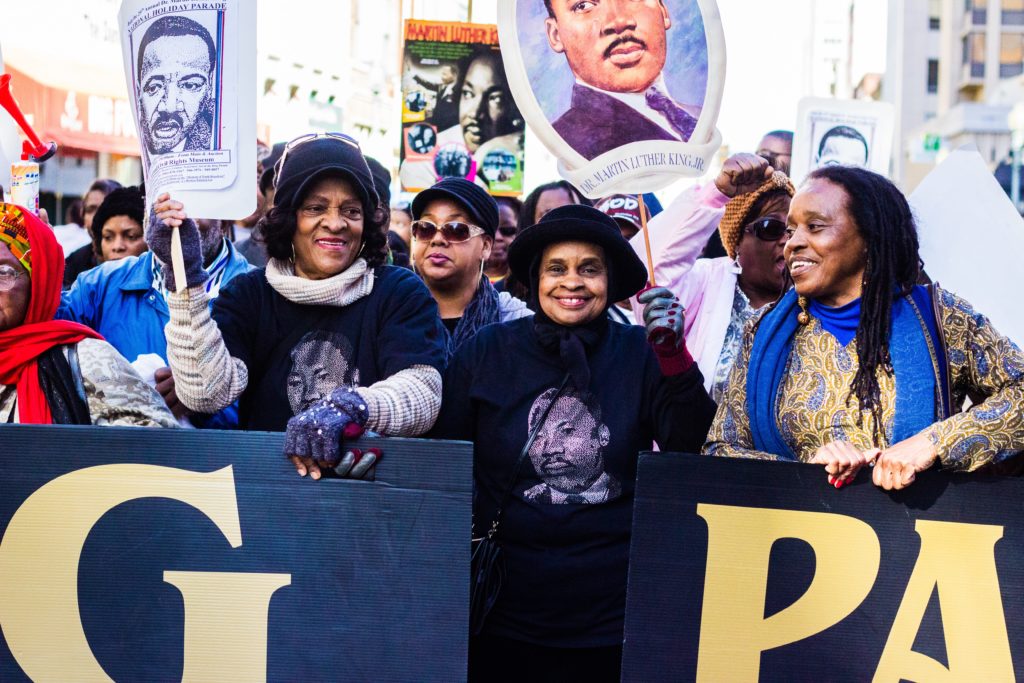
On February 4, 1968, Martin Luther King Jr. delivered a sermon at Ebenezer Baptist Church that I will briefly discuss and link below. This sermon is important during this week of a presidential inauguration and after the insurrection at the capital. MLK’s thoughts are clarion moving of the heart, mind, and soul. The topic of this sermon was “The Drum Major Instinct.” A Drum Major to review is a person that leads the marching band, usually moving a baton and wearing a uniform that stands out, including head regalia. All eyes in the stadium are on that person. It involves the desire to obtain and recognition and to stand out among your peers. Alfred Adler captured this dominant impulse he indicates. MLK, in his sermon, states, “Adler came with a new argument saying that this quest for recognition, this desire for attention, this desire for distinction is the basic impulse, the basic drive of human life, this “drum major instinct.”
Authoritarian leaders praise their followers and the ranks of those joining increase. They know how to manipulate this desire for recognition. MLK tells us that we all feel happy when praised. Dr. King observes that this “drum major instinct” aids in recruiting followers. Political rallies provide a sense of importance, recognition, and attention, especially for the headliner and his chosen audience. This very instinct also explains why so many individuals fall prey to advertisers. Dr. King observes in 1968 that this instinct quickly takes command. Fear heightens instinctual responses, especially during an economic upheaval, a pandemic, and during times of social unrest.
Dr. King tells us that if we do not harness this instinct that it has the potential to become “a very dangerous, pernicious instinct.” It also leads to the toxicity of comparison, where for us to feel better, we find others to devalue. As Dr. King spoke to all, who cared to listen from the pulpit when this instinct distorts her personality, it results in us “trying to push others down” to pull ourselves up. This instinct fuels the embrace of fake news, lying gossip, and the spreading of both vicious and evil rumors. Further, it leads to the exclusivity that enables both prejudice and classism. It is easy to succumb to the belief that we are better than the next person because of our role, stature, wealth, or educational attainment. This false sense of superiority blinds those to their prejudice. Dr. King saw this instinct as evident in the struggle between the world’s nations, leading to the militarization of threat and the race to obtain lethal weapons of mass destruction.
In his sermon, he does not condemn this “drum major instinct” but provides a thorough consideration of its vicissitudes. He suggests that Jesus's recognition of this instinct was something altogether different than disapproval, and it involved channeling this desire in life-affirming actions. In substance, he refers to Jesus as indicating, “Oh, I see you want to be first. You want to be great. You want to be important. You want to be significant. Well, you are to be. If you are going to be my disciple, you must be.” The desire to be first is best when we channel it into the desire to be first in loving others. “I want you to be the first in moral excellence. I want you to be the first in generosity. That is what I want you to do.” Loving one another was the answer, captured in his ministry. We thus need to work together to create a healthier definition of greatness. Dr. King is clear that if we accept compassion, love, and service as the way to answer the pulls of this instinct, then every single one of us will be great. This understanding leads to another approach for making America great again. President Kennedy also spoke to this call for service by asking Americans to start thinking about what they can do for their country. This formula from the 60s can assist us now.
In referring to his life, Dr. King, in this sermon, tells us how he wants to be remembered, and this is something for us to consider. MLK did not seek others to mention that he had achieved a Noble Peace Prize or some 300 to 400 other awards. Instead, he wanted to be remembered for following: he spent his life in the service of others, that he tried to love somebody, that he tried to be on the right side relative to questions surrounding war, that he tried to feed the hungry that he attempted to clothe those who were naked, that in his life he tried to visit those who were in prison, ultimately he attempted to love and serve humanity. He pursued justice, love, and truth by demonstrating his commitment to others. In this time of national strife, we need to think about how to channel our basic instincts in coming together to create a better world. This link contains the sermon and the recorded audio from that day in 1968. https://kinginstitute.stanford.edu/king-papers/documents/drum-major-instinct-sermon-delivered-ebenezer-baptist-church